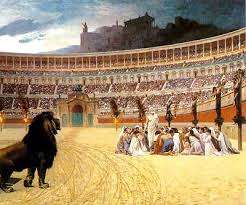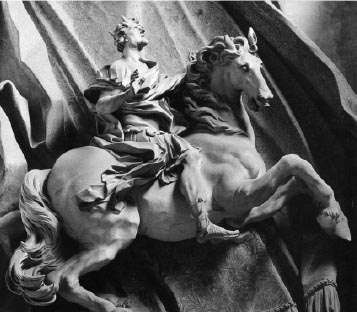
Witness Unto Death - - A Historical Glimpse
Pr. Binoy Eapen Philip
In the early church, Christians were not bad neighbors nor disloyal subjects, nor plotters against the state. Most of them were ordinary working people or slaves. They met in houses. On Sundays, they worked, so they met at nights. When people dislike a minority, they start imagining things that are not there.
Thus persecution against Christians started because the Romans heard that the night meetings of the Christians was called a “love feast.” The rumor spread that after dinner, they got drunk and ended with a sexual orgy. When leader of the church blessed the bread and wine and said, “This is my body and blood,” they accused
Christians of cannibalism.
However, Christianity grew day by day. The Roman emperors feared that if Christianity continued to grow, it would soon become a strong force in Rome. So they decided to destroy this sect. Until the Emperor Constantine recognized Christianity as a lawful religion in AD 313, Christianity was a marginalized sect, subject to heavy persecution.
Persecution the believers underwent in the 1st Century Church
The first persecution took place under Nero Domitius, sixth emperor of Rome. Nero ruled well in the beginning, but later, he became very cruel. Nero contrived all manner of cruel punishment for the early Christians. But the believers who underwent persecution during his time stood faithful until death.
He had believers sewed up in the skins of wild beasts, tortured by dogs until they died. He had others dressed in shirts of stiff wax, fixed them to the trunk of trees and set on fire in his garden. One morning, he ordered that the city of Rome set on fire and blamed it on Christians.
Erastus, the chamberlain of Corinth, Aristarchus the Macedonian, Trophimus, an Ephesian by birth, were helped in their conversion by St. Paul. Joseph, commonly called Barsabbas, and Ananias, Bishop of Damascus, were prominent martyrs during this period.
After Nero, the emperor Domitian persecuted Christians. Some of the martyrs were Simeon, Bishop of Jerusalem who was crucified, St. John who was boiled in oil, and afterwards banished to Patmos. Aavia, the daughter of a Roman senator, was also burned and sent to exile.
Domitian passed a cruel law against Christians which said that every Christian brought before the Tribunal must renounce his or her religion to escape punishment. But this did not move the believers to forsake Christ and His gospel.
The Emperor Trajan ordered that “all the people those who are from the clan of David should be killed.”
Phocas, the Bishop of Pontus, refused to sacrifice to Neptune (a Gentile god) and was cast into a burning lime kiln. He was pulled out and thrown into a scalding bath where he died.
Symphorosa, a Christian believer, and her seven sons were commanded by Trajan to sacrifice to heathen gods, but when she disobeyed, Trajan ordered her taken to the temple of Hercules where she was hung for some time by her hair. When she was told to renounce Christ, she stood firm for her faith. A large stone was tied to her neck, and she was thrown into the river and drowned. Her sons also suffered brutal deaths.
Believers who stood firm for the Lord in the 2nd century
In the second century, persecution to the Christian church began with Marcus Aurelius (161–180). During his period, many Christians were martyred, particularly in Asia and France. Some believers were asked to pass with already-wounded feet over thorns, nails and sharp shells. If they still stood without renouncing Christ, they were destroyed by the most terrible deaths.
Polycarp – A witness unto death
Polycarp, the disciple of John, on hearing that he was on the hit list for serving Christ, decided to escape. But he saw a vision which helped him to become more committed to Christ. In his vision, his bed caught fire and was consumed in a moment. Convinced that this vision foretold his coming death, he submitted himself to God’s will.
When the soldiers came to capture him, he fed them, and then he requested an hour for him to pray, as his last wish. He was given time to pray after which he was thrown into fiery flames where, like the Hebrew sons in the book of Daniel, Polycarp sang praises to God amidst the flames. To kill him, the emperor ordered him pierced. But when he was pierced with a spear - to the surprise of all, the blood from his body consumed the flames. What a great witness. But the cruel ruler brought him out of the fire, killed him and burned his body. To the end, Polycarp stood firm for the cause to which he was called.
Felicitates and her sons witness
Felicitates, a Roman lady of high rank and great ability, was a devout Christian. She had seven sons whom she had educated with most pious care. Publius, a Roman senator, received an order from the emperor to get her to renounce her faith. But he couldn’t persuade her. Thus the whole family was condemned to die. But they were ready to die for Christ. Januarius, the eldest, was scourged and pressed to death with weights. Felix and Philip, the next two sons, were killed by dashing out their brains with clubs. Sylvanus, the fourth son, was killed by being thrown from a precipice, and the three younger sons, Alexander, Vitalis and Martialis were all beheaded. The cruel acts of killing the boys were done at the sight of their mother. But a divine grace helped Felicitates to withstand these cruel hours. She was at last slain with the same sword that had ended the lives of her three sons. This brave act of the mother and the sons even shocked the cruel Roman soldiers.
At Lyons, some of the martyrs were compelled to sit on a red hot iron chair till their flesh was boiled. One of the most dreadful events recorded in the history of the Christian martyrdom took place at Utica where three hundred Christians were hanged around a burning limekiln.
Persecutions in the 3rd century
Persecutions in the 3rd century began by Emperor Maximinus against Christians in AD 235. He ordered to hunt down and slay all Christians.
Origen, a well-known presbyter of Alexandria, was seized and thrown into a prison loaded with chains and his feet placed in the stock for several days. Pontianus, Bishop of Rome, was banished to Sardinia and murdered for preaching against idolatry.
Metrus, an aged and venerable Christian who refused to worship idols, was beaten with clubs, pricked with sharp reeds and at last stoned to death. Quinta, a Christian women refusing to worship idols, was dragged by her feet over sharp flint stones, beaten with whips and finally was killed in the same manner as Metrus.
The brave history of Theodora, a young lady for Christ
Theodora, a young Christian lady of Antioch, on refusing to sacrifice to the Roman idols, was condemned to prison. Her lover in disguise submitted himself as a woman and requested to be killed. But Theodora, on hearing that the lover was about to be killed, came to the judge, fell at his feet and begged that she might be killed, for she was the actual person whom they were planning to kill. But the cruel emperor condemned them both to be killed. They were beheaded and their bodies burned.
Saturnius - A brave witness unto death
The cruel treatment suffered by Saturnius, the Bishop of Toulouse, is a heart breaking history of refusing to sacrifice to the idols. He was tied by the feet to the tail of a bull. At a signal, the animal was driven down the steps of a temple and the head of Saturnius was broken into pieces. This cruel punishment for refusing to sacrifice to the idols for the sake of gospel and Christ was gladly undertaken by him.
Rufina and Secunda - they loved Christ more than their future husbands
Rufina and Secunda, two beautiful and well settled young women, were daughters of a rich Christian, who was also a citizen of Rome. They were engaged to two Christian young men. But when the persecution started, the young men renounced their faith but these courageous young ladies put aside their earthly futures. They valued their heavenly future more than the pleasures of the world. They refused to renounce their faith, and they were cruelly tortured and beheaded.
History of Martyrdom in Utica
One of the most dreadful events in the history of martyrdom was that which took place in Utica, where 300 Christians were placed around a burning lime-kiln and they were commanded to sacrifice to Jupiter otherwise they would be thrown into the kiln. All 300 refused and then bravely jumped into the burning kiln where they died. They all were a witness to Christ till their last breath.
Trachus, Probus and Andronicus were offered promotions if they offered sacrifice to the Roman gods. But they stood firm for their faith and refused to offer sacrifice. They were at first put in a dungeon and brought before the emperor. Still, they refused to offer sacrifices. They then were brought again before the emperor, and wild beasts were let out to kill them. But to the surprise of the emperor and everyone, none of the wild beasts touched these three great servants of the God. The emperor then brought a big bear which on that very day had killed three other persons. But our God who shut the lions’ mouths for Daniel, shut the mouth of this wild bear too.
Maximus, the emperor, on seeing this, feared God inside, but outwardly, he raged and ordered the three Christians to be beheaded. On 11th of October AD 303, they were slain by a sword.
Results of persecution
The rapid spread of Christianity, even during the heaviest persecution, proved the word of Tertullian right: “The blood of Christian martyrs is the seed of the church.”
The blood of persecution was also the seed of civil and religious liberty. At first, Christianity was not given any freedom but later Christians were allowed to conduct their worship. The Edict of Milan, passed in 313 by Constantine, put Christianity in equal terms with any other Roman religion. Christianity was no longer in conflict with the Roman Empire. The fortune or table changed for the persecuted sect to such an extent that Christianity became a procured religion and finally the only legal religion within the Roman empire.
The Diocletian persecution forced upon the church the problem of the Caanan of the New Testament. If the possession of letters might mean death, the Christians wanted to be sure that the books that they would not give up on pain of death were really Canonical books. This consideration contributed to the final discussion as to what literature was Canonical. Apologetic Literature was also created.
The era of persecution is interesting for the light it throws on the perennial problem of the relation of the church to the state. Christianity claimed the exclusive loyalty of its followers in moral and spiritual matters. Christians were to be obedient to the state as long as it did not ask them to violate their moral and spiritual allegiance to God. The problem of obedience to Christ or Caesar is perennial in the history of the church.
Conclusion
The unbending faith of the Christians during the first centuries of the church stood as a shining example to the pagan world. How could somebody stand unflinching in the face of death and claim the crucified Jesus be God, if the story was a myth? Such absolute trust in an unseen God was unexplainable to the pagan mind. What was the source of such a courage? Many non-Christians began their Christian life asking these questions.
Persecution, thought the Roman world, would end the faith of Christians in their God. But century after century persecution only strengthened the faith of Christians in Christ. No Christian ever in the History of Christianity has prayed God to take away persecution from us, rather God gives us boldness to face persecution was their prayer. Because they knew that if their Master was persecuted, persecution was their inheritance. As an answer to their prayer God enabled the martyrs to die for Him like bold soldiers. Their brave death not only attracted ordinary people, even emperors were influenced. Constantine, the Roman emperor who passed the Act of Toleration on Christians in AD 313 started acknowledged the living God.
Persecution in the present century is not as severe as in the early centuries. But nobody is sure what is in hold for the Christian church. Let whatever come, the need of the hour is bold Christians. Let us pray that God give us boldness to face persecution.
The words of a martyr (IPC believer) who recently died for Christ in Chhattisgarh challenge all of us. The heretics caught him and warned him, saying that if he continued to proclaim Christ, he would be killed. In response, the Christian believer said that as long as he would continue to witness of Christ. This is boldness in Christ, and this is the need of the Christian church of today. He was brutally killed on January 22, 2015. But the church in Chhattisgarh shall continue to grow because the blood of their martyr is a seed of the church there.
The same happened in the early centuries in Rome, and in our times in parts of Odisha and Gujarat. But these persecutions only strengthened the Christian church.
“The blood of a martyr is the seed of the Christian church.” Tertullian.


